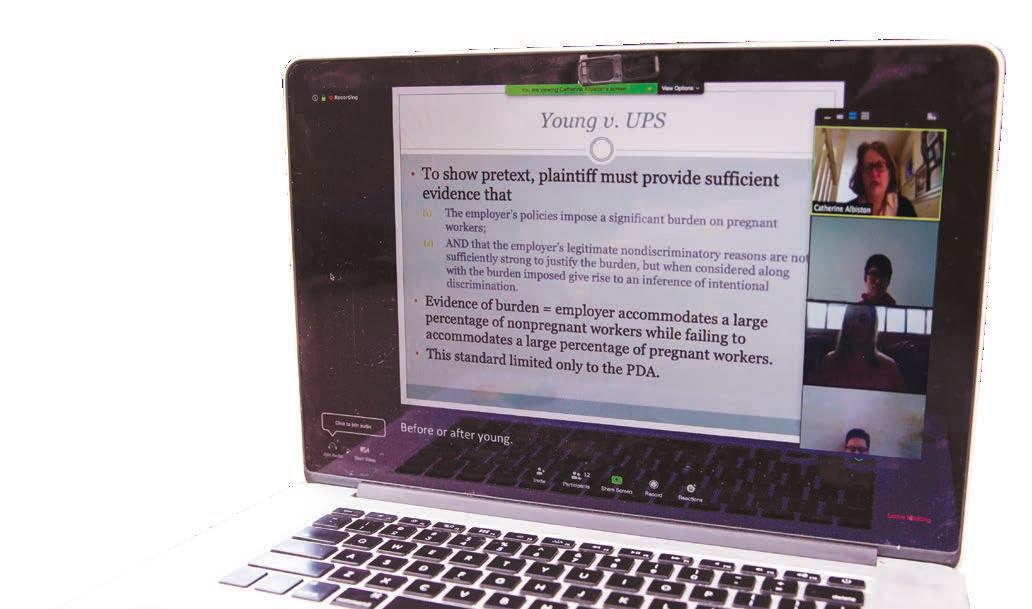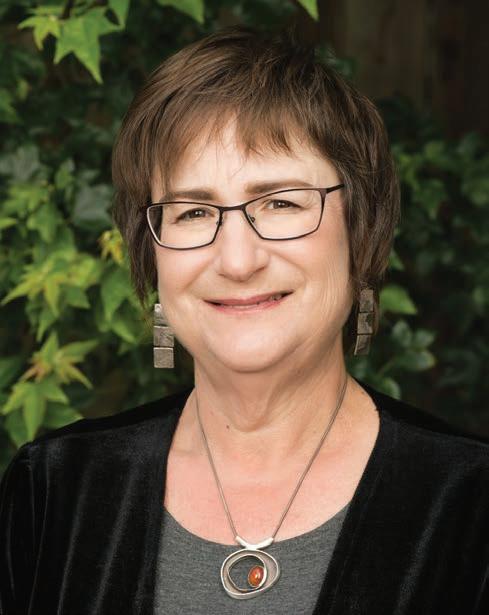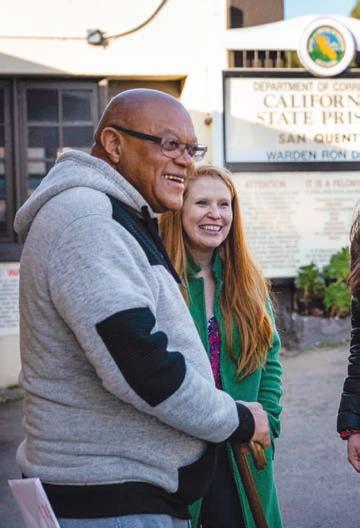
15 minute read
In Brief
from Transcript Fall 2020
by Berkeley Law
Nuggets from the School Community
Transition Team
On March 12, just three days after Berkeley Law announced all classes would be taught online because of COVID-19, Nomi Conway ’20 sat anxiously at her kitchen table with classmate Paul von Autenried. Students in Tejas Narechania’s Colloquium on the Court and Judicial Process, they now had to give their workshop presentation — to classmates, scholars, and judges — on Zoom.
“Given the course’s intimate nature, I was skeptical when I learned we’d have to transition everything online,” Conway concedes. “But Paul and I were shocked by how well it went. The adjustment went smoothly because of the focus on community that Berkeley fosters so well.”

QUICK PIVOT: Nomi Conway ’20 had to recalibrate on the fly.
Narechania helped navigate Zoom’s breakout room feature to facilitate small-group discussions, and students participated eagerly. “They did a great job adapting and remained committed to the class,” he says.
Narechania’s other spring-semester course, Regulated Digital Industries, was a fitting Zoom forum given its focus on telecommunications regulations.
“I still called on students and expected them to engage. But instead of saying ‘turn to page 455,’ I’d put that page on the screen and highlight the relevant text, or draw network diagrams in the Zoom whiteboard,” he says. “That’s not to say it wasn’t tough for some students. I saw it as part of my job to not only be understanding of that, but also helpful. It takes time and energy, but that’s why we’re professors.”
Faculty member and Experiential Education Director Kristen Holmquist was relieved to have her doubts allayed.
“What I love about teaching is the human interaction, those moments of connection,” she says. “But classroom discussion still felt lively and I was able to take advantage of some Zoom functions to get the students to interact with one another even more than they usually would.” —Andrew Cohen
One-Credit Wonders Offered to 1Ls

The new 1L class faces an unprecedented challenge in starting the vaunted first-year law school curriculum virtually. But these students are getting something special from the faculty: a compelling slate of small, one-credit courses.
“With our first-year classes being online in the fall semester, I want to create other ways to build community and provide our 1Ls a wonderful educational experience,” says Dean Erwin Chemerinsky.
He proposed these courses to the faculty so participating students — about 10 in each class — can get to know one another and the professor.
The three dozen courses cover myriad subjects. Students are digging into originalism with Professor Orin Kerr and discovering how Roman law influenced our own system (no Latin required) with Professor David Singh Grewal.
Many faculty members chose topics that reflect the times, including the ongoing COVID-19 pandemic, the movement toward racial and social justice, and climate change. Chemerinsky is teaching Civil Liberties in a Pandemic, and other topics include environmental justice, dismantling the carceral state, and an insider’s look at social movement lawyering.
Still others aim to help 1Ls better navigate their black-letter courses via Zoom. Professor Seth Davis is breaking down how to read a case; Professor Abbye Atkinson has students reading scholarly works by faculty who are teaching first-year students; and Experiential Education Director Kristen Holmquist is offering strategies for being happy in law school.
“I was thrilled at the enthusiastic response from our faculty, and I’m delighted at the rich array of topics and classes for the 1Ls to choose from,” Chemerinsky says. —Gwyneth K. Shaw
A Global View of #MeToo
The #MeToo movement is a worldwide phenomenon, and the Berkeley Center on Comparative Equality and Anti-Discrimination Law has worked furiously to track its global implications.
Led by Berkeley Law Professor David Oppenheimer, the center recently published The Global #MeToo Movement with Full Court Press. The book details how women are using social media to confront one of the oldest barriers to equality: the threat of violence, including sexual harassment, as a tool of male supremacy.

ON THE JOB: Award-winning professor and employment law expert Lauren Edelman ’86 is one of the book’s co-authors.
Featured at a major conference on the topic, the book provides updates and insights of 48 authors from every continent except Antarctica, including leading university professors, NGO activists, and government officials. Among them: iconic feminist legal scholar Catharine MacKinnon, an Israeli Supreme Court justice, a member of the Irish Senate, and Berkeley Law faculty members Catherine Fisk ’86, Lauren Edelman ’86, Amelia Miazad ’02, and Oppenheimer.
In addition to reports from 28 countries, the book explains how factors such as class, caste, disability, race, gender, and sexual orientation intersect with issues of harassment and affect the agency of victims to speak out. It also highlights various techniques to help women combat harassment.
“Each chapter documents the #MeToo narrative from a different global perspective, and brings new insights to the fight against discrimination and harassment,” Oppenheimer says.
At www.globalmetoobook.com, the book is available in paperback for $16 but can be downloaded for free, with a suggested $5 contribution to the center. —Andrew Cohen
Acing the Career Development Test
A study of full-time and long-term jobs — for which a J.D. and bar passage are necessary or advantageous — ranks Berkeley Law first in California and fifth among the nation’s elite “T-14” law schools.
Conducted by Pepperdine University Caruso School of Law Professor Derek Muller, the study shows that 97 percent of Berkeley Law’s 2019 graduates occupy such positions. His list does not include part-time or short-term jobs, and it excludes graduates who are pursuing a Ph.D. as well as those who are doing other types of professional work that do not require a J.D.
JSP Juggernaut

BACK TO BACK: Cristina Violante is the Jurisprudence and Social Policy Program’s second consecutive winner of a top national writing competition.
Berkeley Law’s Jurisprudence and Social Policy Program did it again. For the second consecutive year, a JSP student won the prestigious American Bar Foundation Graduate Student Paper Competition, which is presented by the international journal Law & Social Inquiry.
Cristina Violante earned this year’s award for Liquidity: Water and Investment in Mandate Palestine, which will be published early next year. Last year, Tobias Smith ’15 was honored for Body Count Politics: Quantification, Secrecy and the Death Penalty in China.
The JSP Program leads to Ph.D. degrees for those seeking an interdisciplinary study of legal ideas and institutions, policy analysis and applied research on law-related issues in various fields, and preparation for teaching legal studies and law. Violante — who has presented her paper at conferences — notes that studying water law requires an approach that is simultaneously historical, philosophical, and sociological.
“Legal scholarship has the ability to lead to real and profound change,” she says. “But without interdisciplinarity, conversations tend to become siloed and the potential to ask the right kinds of questions is greatly diminished.” —Andrew Cohen
Capitalism Arrives at a Crossroads

As COVID-19 lays bare the depth of income inequality and renewed calls for racial and social justice ring out worldwide, companies are scrambling to send the right message to their customers and employees. But will sentiments expressed on social media translate into lasting change?
A leader in exploring how environmental, social, and governance (ESG) questions are and should be integrated into corporate strategy, Berkeley Law’s Business in Society Institute recently launched a new executive education course, taking the topic to laptops worldwide.
Founding director Amelia Miazad ’02, who developed and teaches the school’s growing suite of courses bridging corporate law and social and environmental justice, says Sustainable Capitalism and ESG Online hopes “to move beyond the ‘why’ to the ‘how.’”
“We’re drawing from the experience of almost 50 investors and practitioners who are on the front lines of advocating for a new articulation of capitalism every day,” says Miazad, who conducted the interview series.
Designed for legal and business professionals, the selfpaced course sold out in July before launching in August. It provides about 35 hours of content over 10 modules and offers a certificate upon completion.
Participants hear from heavy hitters such as Airbnb Chief Ethics Officer Rob Chestnut, Patagonia General Counsel Hilary Dessouky, and former Delaware Supreme Court Chief Justice Leo Strine Jr. Miazad also hosts live weekly office hours to discuss emerging issues.
“Berkeley Law has a unique advantage to help lead the way at this crucial juncture for capitalism,” she says. “We have a very strong business law program, but we also have an unparalleled commitment to social and environmental justice.” —Gwyneth K. Shaw
Georgia on Their Mind
In a 5-4 decision, the U.S. Supreme Court ruled last spring that Georgia cannot claim copyright protection for its annotated legal code — and gave the Samuelson Law, Technology & Public Policy Clinic a reason to celebrate.

COPYRIGHT CREW: Samuelson Clinic students Erin Moore ’21 (left), Aislinn Smalling ’20 (center), and Emma Lee ’21 outside the U.S. Supreme Court.
The clinic had filed an amicus brief on behalf of four library associations, arguing that the government edicts doctrine (that the law is in the public domain) is crucial to libraries’ mission. Drafted by students Emma Lee ’21, Erin Moore ’21, and Aislinn Smalling ’20, with help from clinic professors Erik Stallman ’03 and Jennifer Urban ’00, the brief asked the court to reject Georgia’s claim.
After the state created various roadblocks to people trying to read its updated state laws, the clinic worked to ensure that Georgians can easily use their libraries to consult those laws on legal issues like traffic tickets and child custody. Its brief noted the implications of making the code’s annotations available only to those who can afford them.
“For the government to function, particularly in a democracy, citizens must have access to the law,” Urban says. “It’s the government’s duty to publish the law. We pay for that as taxpayers.” —Sarah Weld
Berlin Bound

Professors Saira Mohamed and Bertrall Ross are among 21 winners of the annual Berlin Prize, coveted semester-long residential fellowships given to U.S.-based scholars, writers, composers, and artists who represent the highest standards of excellence in their fields. Chosen by an independent selection committee, fellows receive a monthly stipend, partial board, and accommodations at the American Academy in Berlin’s lakeside Hans Arnhold Center.
During their stay, fellows engage audiences through public lectures, readings, and performances, which form the core of the academy’s public program. Mohamed will explore the military obligation to disobey illegal orders, and Ross will probe competing conceptions of selfgovernment that culminated in the U.S. Constitution’s 15th Amendment.
Pro Bono Power

CELEBRATION: Alex Copper ’20, who spent 2 1/2 years working to help Larry Histon gain parole, rejoices in his release from San Quentin.
Berkeley Law’s 2020 graduates contributed more than 22,600 hours of pro bono work, well above the stillimpressive school norm of 19,000. To stand out in such a crowd requires extraordinary tenacity and leadership — traits Pro Bono Champion recipients Kiki Tapiero ’20 and Alex Copper ’20 showcased in abundance.
As a 2L, while most classmates crammed for final exams, Tapiero coordinated a winter break pro bono trip to Tijuana, Mexico. There, they and nine other students spent a week helping migrants and refugees hoping to gain asylum into the United States.
Tapiero also co-directed the Berkeley Immigration Group, which enjoyed a dramatic membership increase during their tenure, and was active in the East Bay Community Law Center’s Immigration Clinic and the La Raza Workers’ and Tenants’ Rights Clinic.
“Berkeley Law’s pro bono culture is very much informed by its students’ passion,” says Tapiero, now working for the Bronx Defenders Immigration Practice.
Copper and Sydney Royer ’20 spent 2½ years helping a San Quentin prisoner through the school’s Post-Conviction Advocacy Project, resulting in an exhilarating parole grant.
Copper also provided much-needed legal assistance on Berkeley Law Alternative Service Trips to Kentucky and Mississippi and was the program’s executive director. Former managing editor of the California Law Review and active in the Policy Advocacy Clinic and the Election Law Practicum, she is now a fellow focused on election law and voting rights issues with the Campaign Legal Center in Washington, D.C.
“At Berkeley Law, pro bono work and legal service are an assumption, not an exception,” Copper says. “It’s a place where you’re constantly surrounded by brilliant, kind people doing inspiring work to help others.” —Andrew Cohen
Accomplished American

NATIONAL HONOR: Chalk up another major distinction for Professor Emeritus Malcolm Feeley.
Professor Emeritus Malcolm Feeley, a pioneer of the law and society field, was elected to the American Academy of Arts and Sciences. The prestigious 240-year-old organization honors the most accomplished artists, scholars, scientists, and leaders in the country.
Berkeley Law held a conference to honor Feeley’s seminal work in 2015. Last year, Cambridge University Press published the book Legal Process and the Promise of Justice, in which prominent scholars analyze Feeley’s research on such areas as criminal courts, legal professionalism, and prison reform — and assess the legacy of his theoretical innovations.
Parental Guidance
When COVID-19 shuttered schools and daycare centers, Berkeley Law students with young children were suddenly transformed into full-time students, caregivers, homeschool teachers, and play partners.
“It was exhausting and stressful,” Sarah Graham ’22 says. “Most working parents we know were in the same boat, trying to stay on top of things and feeling like we’re not doing any of it well.”
Graham and her spouse split daily childcare so she could attend Zoom classes and study. They also had to brainstorm outings and activities for their 2-year-old son, Sasha, with many area parks and beaches closed and friend interaction off limits.
Graham found welcome relief in Berkeley Law’s Student Parents Group and its productive meetings with Dean Erwin Chemerinsky, Dean of Students Annik Hirshen, and Student Services staff. “They were all incredibly helpful,” Graham says. “It remains an uncertain time, but it’s great to know that the law school is sensitive to how parenting impacts its students.”
Pallavi Kondapalli ’20 was externing full-time at the Electronic Frontier Foundation when her well-planned semester got turned upside down — especially with her husband gone four days a week as an essential worker at his software company.

“I had to be a full-time caregiver for my two sons, Advaita (8) and Vedanta (5),” Kondapalli says. “I worked for six hours every alternate night, but it still wasn’t possible to clock 40 hours a week. All student parents appreciated the initiative taken by the school to invest time and resources in problems we faced, particularly with respect to accommodations and help with housing.” —Andrew Cohen

FAMILY FIRST: Sarah Graham ’22 (top) and Pallavi Kondapalli ’20 say Berkeley Law provides vital support for student parents.
Highlight Reel
Professor Frank Partnoy raised eyebrows and heartbeats with an article in The Atlantic (July/August issue) on how the U.S. banking system is replicating risky blunders from 2008’s financial crisis — this time through collateralized loan obligations — and why the result could be even worse.
Keker, Van Nest & Peters awarded $75,000 in scholarship funding to four Diversity Scholar recipients — three of them Berkeley Law students. Susana Herrera ’22, Erica Peña ’22, and Yongbin Chang ’22 were chosen for their “incredible promise in the legal field” and interest in complex litigation.
More than 350 people attended the Berkeley Center for Law and Business’s annual financial fraud symposium (virtually) June 23-25. The event received broad media coverage, with panelists from academia, law, government, industry, and the press probing trends and possible solutions.
Human Rights Center Executive Director Alexa Koenig ’13 Ph.D. was honored as a “Woman Inspiring Change” by Harvard Law School. Fellow recipients included Supreme Court of Canada Justice Rosalie Silberman Abella, former U.S. Senator Claire McCaskill, and 2018 Nobel Prize winner Nadia Murad.
The Center for Law, Energy & the Environment issued two recent reports with proposed solutions to manage California’s electrical grid (vital to the state’s renewable energy goals but also a source of community vulnerability) and to ensure battery supply chain sustainability for electric vehicles.
Salzburg Cutler Fellow in International Law and award-winning poet Henry Leung ’21 was one of three “provocateurs” during “Has Democracy Become A Spectator Sport?”, a July webinar featuring former Georgia House Minority Leader Stacey Abrams and Journal of Democracy Co-Editor Will Dobson.
Clinical Reinforcements
Berkeley Law’s flourishing in-house clinics recently welcomed six new teaching fellows and a supervising attorney. Their arrival will expand the program’s outreach to marginalized communities and individuals and help provide students with more valuable hands-on training.
Gabrielle Daley
Teaching Fellow, Samuelson Law, Technology & Public Policy Clinic Previously: Associate at Kissinger & Fellman, P.C.
“I had the great privilege of being a student attorney in the SamuelsonGlushko Technology Law & Policy Clinic at the University of Colorado Law School. It’s an honor to be joining the sister clinic here at Berkeley.”
Juliana DeVries ’17
Teaching Fellow, Samuelson Law, Technology & Public Policy Clinic Previously: Assistant federal public defender, Northern District of California
“The Samuelson Clinic consistently takes on fascinating and important cases. I’m particularly excited about its expanding civil liberties and criminal justice work and about the talented faculty I’ll get to learn from.”
Kelly Woolfolk
Supervising Attorney, New Business Community Law Clinic Previously: Counsel for Harvest Studios LLC, a television production company
“Experiential education is a highcaliber resource which can make the difference in whether burgeoning careers thrive or sputter. I’m honored to join the NBCLC to support and inspire students in service to local communities.”
Rachel Wallace
Teaching Fellow, Policy Advocacy Clinic Previously: Master’s degree, UC
Berkeley Goldman School of Public Policy
“The clinic’s work aligns with my commitment to eradicating racialized wealth extraction through the imposition of monetary sanctions. Working in a space where the projects reflect my values is incredibly important to me.”
Anavictoria Avila
Teaching Fellow, Policy Advocacy Clinic Previously: Education advocate and clinical instructor, East Bay Community Law Center
“Mentorship is very important to me. I look forward to working with teams of law and public policy students to address systemic racial, economic, and social injustice through innovative and solutionoriented strategies.”
Maiya Zwerling
Teaching Fellow, Policy Advocacy Clinic Previously: Master’s degree, UC Berkeley Goldman School of Public Policy
“I am thrilled to bring my passion for front-loading strategic planning to support the development of a national campaign to abolish fines and fees that target young people and trap black and brown communities in poverty.”
Astha Sharma Pokharel
Teaching Fellow, International Human Rights Law Clinic Previously: Bertha Justice Fellow at the Center for Constitutional Rights
“I look forward to thinking critically about how to do transformative and anticolonial transnational justice work. I really appreciate the clinic’s focus on exposing U.S. actors’ responsibility for human rights violations.” Thanks to everyone who submitted entries to Berkeley Law’s caption contest when the cartoon below was posted on the school’s social media channels after Commencement. And thanks to all of you who voted on the three finalists. The votes have been tallied, and the winning caption is:
Caption Contest
In our spring issue, we asked you to caption this pandemic-themed graduation cartoon. Here's the winning entry.

—Professor Chris Hoofnagle










